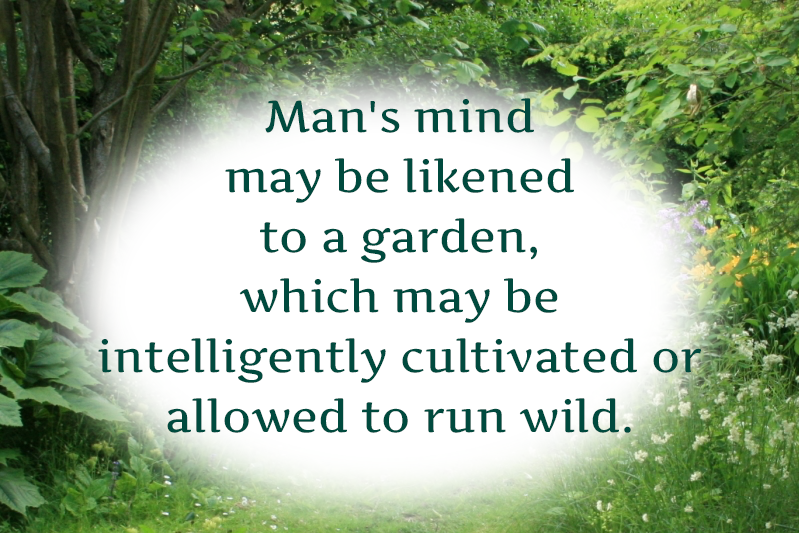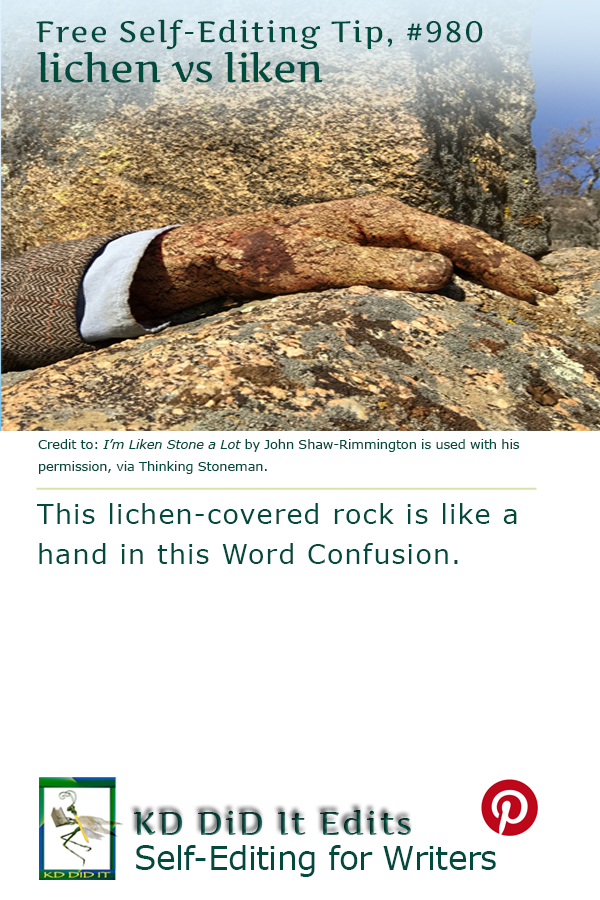You’ve got to read John Shaw-Rimmington’s post, “I’m liken stone a lot“, which was posted 24 February 2018. He has way too much fun with lichen and liken, lol.
That said, you may have guessed that lichen and liken are heterographs (a subset of homophone). And no, this is another pair of words that don’t crop up often.
When it does, I gotta say that when I read about someone lichen something a lot…I get worried. That character could be a potential terrorist planning to cover the world in moss. Although, hmmm, I suppose it could be an environmentalist who has discovered the edible properties of lichen…?
Just the thought of eating lichen has me thinking of those futuristic sci-fi novels where the world is reduced to eating yeast or soy everything. Ick. I likes me some meat!
So I’ll be hopin’ that writers will liken their work to a world of abundance where lichen is simply a gorgeous texture on stone, bark, clay pots…
Word Confusions…
…started as my way of dealing with a professional frustration with properly spelled words that were out of context in manuscripts I was editing as well as books I was reviewing. It evolved into a sharing of information with y’all. I’m hoping you’ll share with us words that have been a bête noir for you from either end.
If you found this post on “Lichen versus Liken” interesting, consider tweeting it to your friends. Subscribe to KD Did It, if you’d like to track this post for future updates.
| Lichen | Liken |
|---|---|
| Credit to: Apple Dictionary.com; Dictionary.com: lichen, liken; Lexico.com: lichen, liken | |

Letharia vulpina (L.) Hue by Jason Hollinger is under the CC BY-SA 3.0 license, via Wikimedia Commons and courtesy of the Mushroom Observer. — A beautiful lichen… |

Wild Garden by Sten Porse is under the CC BY 2.0 license, via Wikimedia Commons. — I love the quotation that likens man’s mind to the tame and the wild. |
| Part of Grammar: | |
| Noun; Verb, transitive
Plural for the noun and third person present verb: lichens |
Verb, transitive
Third person present verb: likens |
| Noun: A simple slow-growing plant that typically forms a low crusty, leaflike, or branching growth on rocks, walls, and trees [Pathology; usually with modifier] A skin disease in which small pimples or bumps occur close together Verb, transitive: |
[liken someone, liken something to] Point out the resemblance of someone or something to
To represent as similar or like
|
| Examples: | |
| Noun: Lichens are composite plants consisting of a fungus that contains photosynthetic algal cells. Lichens obtain their water and nutrients from the atmosphere and can be sensitive indicators of atmospheric pollution. The cedars are festooned with lichen. There were rocks covered with golden lichens. We had some patients with oral lichen planus. The white buccal lesions of oral lichen planus may necessitate biopsy to exclude leukoplakia, candidiasis, and secondary syphilis. The differential diagnosis includes psoriasis, lichen simplex chronicus, prurigo nodularis, and lichen planus. Verb, transitive: Ewww, I can’t believe you lichened that picture frame to look like bat wing’s lichen. May and Anna are out in the garage lichening a bunch of clay pots. |
They likened the reigning emperor to a god.
She sure doesn’t like him, as she likened him to a weasel. The comparison might be very useful for likening a certain management to a Hitlerian menace. In a blizzard of eulogies, Henderson was likened to — among others — Socrates and Burns. NHS dental care in Yorkshire has been likened to that in a Third World country. She likens her pieces to miniature abstract paintings — each one is an individual. |
| Derivatives: | |
| Adjective: lichen-like, lichened, lichenose, lichenous, lichenoid, unlichened Noun: lichenization, lichenology |
Adjective: unlikened Noun: likeness |
| History of the Word: | |
| Early 17th century via the Latin from the Greek leikhēn. | First recorded in 1275–1325, liken is from the Middle English liknen, which is from the Old Norse líkr meaning like + -en from the Old English -nian, which is of Germanic origin. |
C’mon, get it out of your system, bitch, whine, moan…which words are your pet peeves? Also, please note that I try to be as accurate as I can, but mistakes happen or I miss something. Email me if you find errors, so I can fix them…and we’ll all benefit!
Satisfy your curiosity about other Word Confusions on its homepage or more generally explore the index of self-editing posts. You may also want to more generally explore the index of self-editing posts. You may also want to explore Formatting Tips, Grammar Explanations, Linguistics, Publishing Tips, the Properly Punctuated, Writing Ideas and Resources, and Working Your Website.
Pinterest Photo Credits:
I’m Liken Stone a Lot by John Shaw-Rimmington is used with his permission, via Thinking Stoneman.


